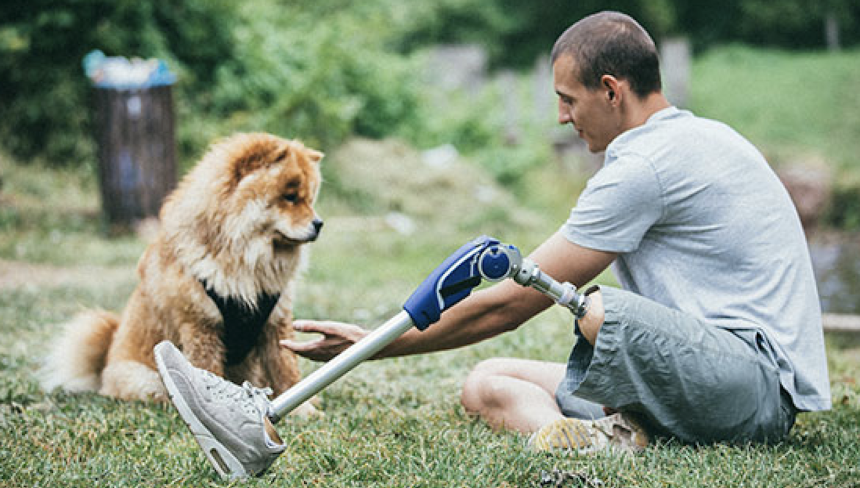Therapy animals have shown a remarkable ability to provide comfort, companionship, and therapeutic support to individuals navigating amputation recovery. The physical and emotional challenges following amputation can feel overwhelming as individuals adjust to significant changes in their daily lives and mobility. Therapy animals are essential in helping amputation patients build resilience, maintain a positive outlook, and work toward long-term healing. For many, the presence of a supportive, empathetic animal can offer a unique form of encouragement and strength that other forms of therapy alone may not provide.
Beyond companionship, therapy animals contribute positively to the recovery journey by fostering emotional balance and reducing anxiety and depression. In addition, animal-assisted therapy promotes engagement in physical activities, often essential for improving mobility and overall wellness after an amputation. Their unconditional support can empower individuals, encouraging them to face their recovery with renewed optimism and determination.
Emotional Support from Therapy Animals
The emotional benefits provided by therapy animals are invaluable to those recovering from an amputation. Many individuals experience mixed emotions, such as frustration, sadness, or anger, as they adapt to their new reality. Therapy animals offer non-judgmental companionship, providing stability and unconditional love, which helps reduce feelings of loneliness and isolation. This connection can significantly alleviate stress, offering a source of comfort and calm during difficult times.
Animals in therapy can also foster a safe space for individuals to express emotions and cope with their unique experiences. Their calming presence encourages patients to process their emotions constructively, fostering resilience and emotional strength. Studies show that therapy animals can reduce symptoms of anxiety and depression, which are common in amputation recovery, helping individuals maintain a positive mindset throughout their journey.
Physical Rehabilitation with Therapy Animals
Therapy animals are beneficial for emotional recovery and play a crucial role in physical rehabilitation. During the rehabilitation process, amputation patients may face mobility challenges that require consistent physical therapy. Therapy animals motivate patients to engage in these exercises, making the process feel less strenuous and more enjoyable. Walking with a therapy dog or engaging in gentle play encourages patients to improve their balance, stamina, and coordination.
In addition to providing motivation, therapy animals can assist with physical tasks in the early stages of recovery. Certain therapy dogs, for example, are trained to help stabilize individuals as they regain their strength and mobility. This added support can enhance confidence, empowering patients to push through the physical challenges of amputation recovery and embrace a more active lifestyle.
Reducing Anxiety and Depression
The journey to recovery following an amputation can be filled with uncertainties and stress, often leading to heightened levels of anxiety and depression. Therapy animals have been found to lower stress-related hormones and promote feelings of relaxation, significantly benefiting mental health. The presence of an animal can naturally reduce cortisol levels, helping individuals maintain a calm and steady demeanor during their recovery journey.
By fostering a positive emotional state, therapy animals allow individuals to focus on their progress rather than their limitations. This shift in mindset can be transformative as patients become more willing to engage in rehabilitation and pursue goals. Therapy animals’ affectionate nature offers a consistent source of joy and hope, essential for individuals navigating the complexities of amputation recovery.
Building Routine and Structure
For many individuals, amputation recovery requires creating new routines and structures in their lives. Therapy animals contribute to this process by helping individuals establish a daily rhythm, which can aid in both mental and physical recovery. Patients can incorporate structured activities into their routines by feeding, walking, and caring for a therapy animal, which can be particularly helpful for those struggling with a loss of purpose or motivation.
These structured activities provide not only physical engagement but also a psychological boost, as individuals feel a renewed sense of responsibility and accomplishment. The routines developed with a therapy animal can ease the transition back to independent living and help patients regain control over their daily lives.
Developing Social Connections
Amputation recovery can often feel isolating, as patients may withdraw from social activities and support networks. Therapy animals, however, encourage social interaction and open up opportunities for individuals to connect with others. Many amputation patients find that walking a therapy dog, for example, creates natural opportunities to interact with neighbors or other pet owners, helping rebuild a sense of community.
Therapy animals also provide an easy conversation starter, allowing patients to share their experiences and build relationships. Engaging with others can significantly reduce feelings of isolation and contribute to emotional healing, creating a support network that lasts well beyond the recovery period.
Support Systems for Life After Amputation
Finding consistent support after an amputation injury in Denver is essential for a successful recovery. Therapy animals can be an invaluable part of this journey, as they encourage both mental and physical healing. The companionship they provide offers comfort and reassurance, which is particularly beneficial for those adapting to life after an amputation. Through organizations and programs offering therapy animal services, amputation patients in Denver can find tailored support to meet their unique needs during the recovery process.
Therapy animals not only assist with practical aspects of recovery but also foster emotional resilience and positivity. For individuals dealing with the challenges of amputation, having this form of support can make a substantial difference in the healing process. Engaging with therapy animals helps patients remain hopeful and focused on achieving their goals, reinforcing the importance of holistic recovery support in Denver.
Enhancing Confidence and Self-Esteem
One of the greatest challenges following an amputation is often a decline in self-esteem as individuals adjust to a changed body image and physical limitations. Therapy animals play an essential role in restoring confidence, as they provide companionship without judgment, reinforcing a sense of self-worth. This unconditional acceptance encourages patients to view themselves in a positive light and regain confidence in their abilities.
Therapy animals help patients celebrate small victories, creating a supportive environment that fosters self-acceptance. Therapy animals inspire a renewed belief in one’s ability to adapt and thrive by assisting with rehabilitation exercises and accompanying individuals during daily activities, empowering amputation patients to embrace life’s new possibilities.
Lynn Martelli is an editor at Readability. She received her MFA in Creative Writing from Antioch University and has worked as an editor for over 10 years. Lynn has edited a wide variety of books, including fiction, non-fiction, memoirs, and more. In her free time, Lynn enjoys reading, writing, and spending time with her family and friends.















